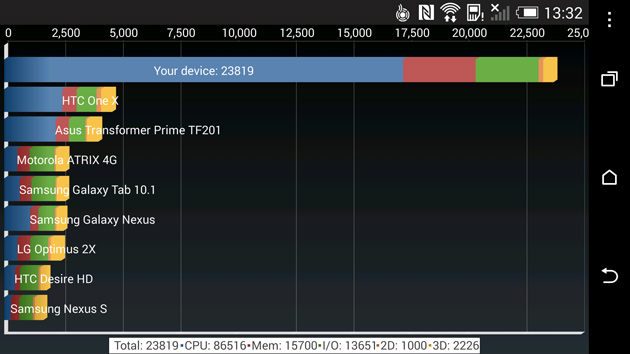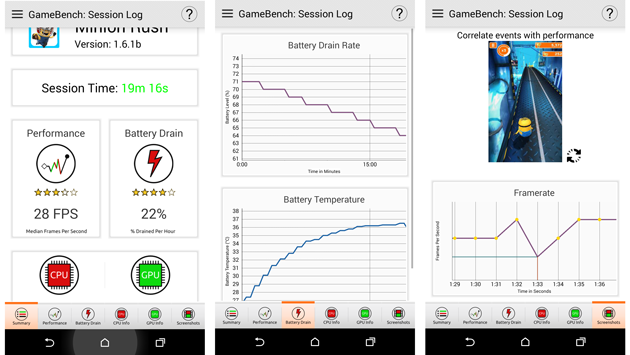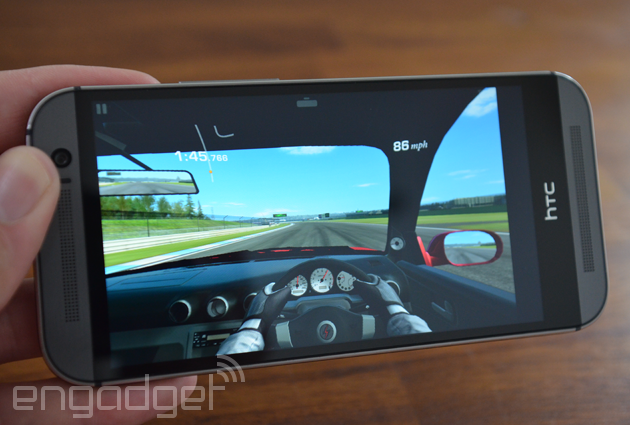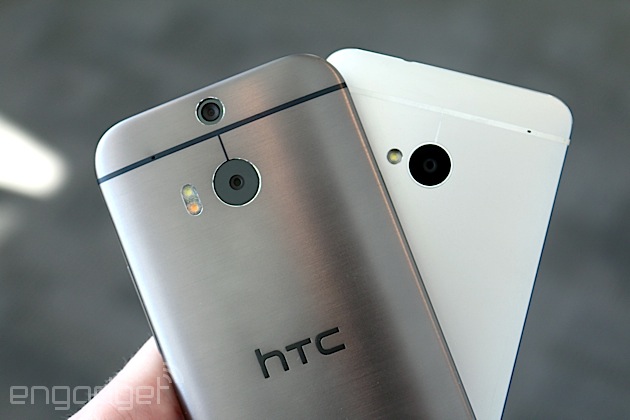but which happens to have reached the market first in HTC's flagship
phone. This chip represents a significant upgrade over the Snapdragon
600 in the old One,
promising a hat trick of better all-round performance, more fluid
gaming and longer battery life, and these are precisely the claims we're
about to explore using a combo of benchmarking apps and real-world
tests. At the same time, HTC has suddenly decided to come clean on the
issue of benchmark cheating, which makes it a bit easier for us to trust what the numbers are telling us.
Honest cheating

but let's just say it's been a pretty depressing affair. In fact, if HTC
hadn't made a significant change to the way the new One handles
benchmarks, we probably wouldn't have bothered with this article at all,
for fear of leading you astray. Fortunately though, that change has
been made.
HTC has acknowledged to us that, in the past, it has forced its
devices to run in a so-called High Performance Mode (HPM) whenever a
well-known benchmarking app was launched. This mode boosted the
processor's clock speeds to levels that weren't available to other apps,
causing excessive battery drain and temperature increases solely for
the purpose of achieving unrealistically high benchmark scores. The
company could (and probably should) have put an end to this
practice, but instead it has gone the other way: High Performance Mode
on the new One is available to anyone who wants it, in any app they
like, by means of a tickbox in the Developer Options screen.
High Performance Mode on the new One is available to anyone who wants itLet's be clear: There's still some cheating going on here because you cannot disable
High Performance Mode in a benchmarking app in order to measure the
One's regular, non-accelerated behavior. That's why the numbers in the
HPM column below mostly look the same as the non-HPM column. But by
making HPM available to everyone, HTC has at least sidestepped the worst
allegations against it and made things a little more open.
General performance
| HTC One (2014) | HTC One (2014) HPM | HTC One (2013) | Galaxy Note 3 | |
|---|---|---|---|---|
| Quadrant 2.0 | 25,548 | 23,555 | 11,952 | 23,278 |
| Vellamo 2.0 | 1,804 | 1,668 | 1,435 | 2,501 |
| Vellamo 2.0 Metal | 1,280 | 1,269 | 749 | 1,194 |
| AnTuTu 3.2 | 30,100 | 30,613 | 26,081 | 35,340 |
| SunSpider 1.0, stock browser | 570 | 577 | 940 | 537 |
| Geekbench 3 single-core | 941 | 989 | 626 | 934 |
| Geekbench 3 multi-core | 2,595 | 2,990 | 1,968 | 2,928 |
| CF-Bench | 38,526 | 38,489 | 27,601 | 33,785 |
the new One from an old One, or from a 2012 phone like the One X or One
X+, should see a solid and noticeable jump in general performance.
SunSpider reveals that browser page rendering is almost twice as quick,
whether you use the stock browser or Chrome. Benchmarks that test the
CPU, memory and a range of other components, such as CF-Bench and
AnTuTu, show improvements of between 10 and 50 percent, with Quadrant's
score being around double.
On the other hand, there's much less to shout about when we stack the HTC phone up against last year's Samsung Galaxy Note 3,
which was one of the most popular implementations of the Snapdragon
800. Here we see only marginal gains in the region of 5 to 20 percent,
with a couple of tests still putting the older device in the lead. This
tallies with the fact that HTC has opted for a 2.3GHz version of the
801, which matches the CPU clock speed of the 800 and only offers a
slight boost in memory and GPU speeds.
Graphics and gaming tests
| HTC One (2014) | HTC One (2014) HPM | HTC One (2013) | Galaxy Note 3 | |
|---|---|---|---|---|
| GFX Bench TRex Offscreen | 28.2 | 28.3 | N/A | 26.3 |
| GFX Bench Manhattan Offscreen | 11.1 | 11.1 | N/A | 9.3 |
| 3DMark Ice Storm Unlimited | 20,440 | 20,433 | 10,238 | 18,828 |
| GameBench fps (Minion Rush)* | 28 | 29 | 27 | 28 |
| GameBench % drain per hour (Minion Rush)* | 22 | 25 | 32 | 20 |
| *Scores achieved using GameBench beta app, not certified by GameBench itself. | ||||
even bigger gains compared to the old One, as well as a significant step
up from the Note 3. The only real-world test in our arsenal, GameBench,
shows a small gain of 1 fps in regular mode, or 2 fps in High
Performance Mode, which doesn't seem so impressive. However, this test
involves measuring a phone's performance while an Android game is being
played, and in this instance it probably tells us more about the game (Despicable Me: Minion Rush)
than it does about the phone. After all, most mainstream Android games
are designed to run on a wide range of devices, rather than to exploit
the extra power offered by top-end phones.

draining a third of its battery each hour, the Snapdragon 801 proved to
be capable of delivering slightly smoother graphics alongside a much
lower drain rate. This drain rate was almost as low as the Note 3's,
despite the fact that Samsung's phablet contains a much larger battery
(3,200mAh vs. 2,600mAh).
For reference, the new One also produced a great result in the standard battery rundown test for our main review,
lasting 11.5 hours (vs. 6.5 hours on the old One and 9.5 hours on the
Note 3). So, we can safely say that this phone is very efficient,
regardless of whether it's being stressed or doing something less
taxing, like playing a video.
Wrap-up
The conclusion here is simple: The HTC One has a very solidprocessor, and if you compare it to the old One, then you should see
major improvements in both speed and battery life -- which is exactly
what we all want. But if you stack it up against current Snapdragon 800
phones, the One is only a small step forward -- it's better in a lot of
tests, but if you own something like a Galaxy Note 3, then you probably
wouldn't notice much difference. When the Galaxy S5 and Xperia Z2
arrive, both with bigger batteries and, in Samsung's case, with even
higher clock speeds, the One will likely be edged out of the top spot on
any benchmarking table. Nevertheless, so long as we don't pay too much
attention to what else lies on the horizon, we reckon HTC has given its
latest phone more than enough grunt to satisfy even the most demanding
of power users in 2014 and beyond.


No comments:
Post a Comment